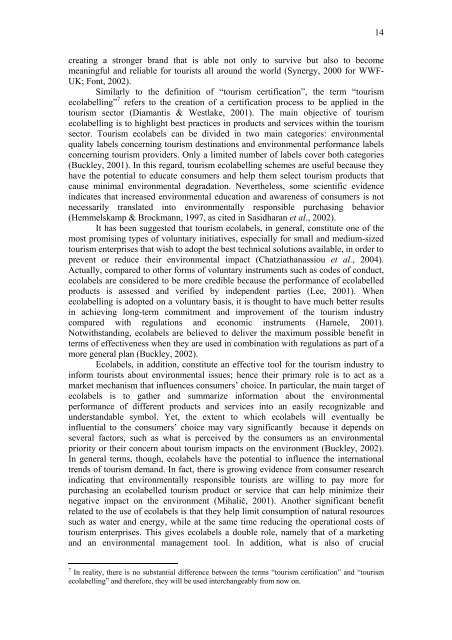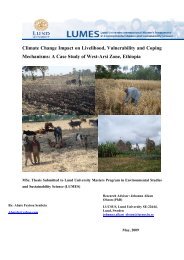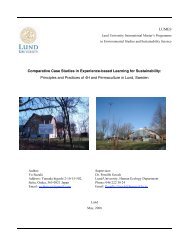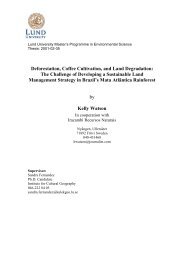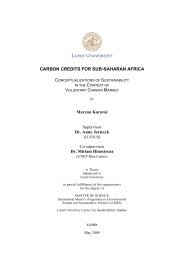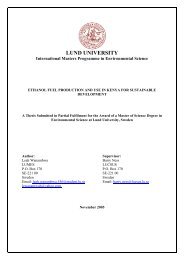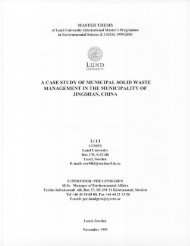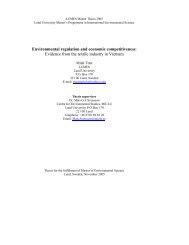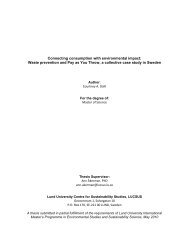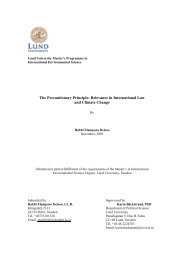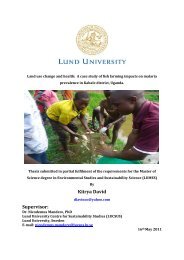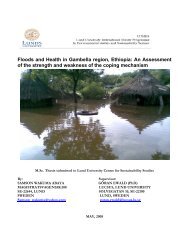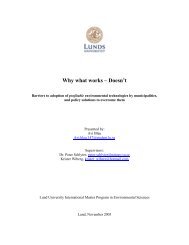Thesis title: âThe development of community-based ecotourism - lumes
Thesis title: âThe development of community-based ecotourism - lumes
Thesis title: âThe development of community-based ecotourism - lumes
You also want an ePaper? Increase the reach of your titles
YUMPU automatically turns print PDFs into web optimized ePapers that Google loves.
14creating a stronger brand that is able not only to survive but also to becomemeaningful and reliable for tourists all around the world (Synergy, 2000 for WWF-UK; Font, 2002).Similarly to the definition <strong>of</strong> “tourism certification”, the term “tourismecolabelling” 7 refers to the creation <strong>of</strong> a certification process to be applied in thetourism sector (Diamantis & Westlake, 2001). The main objective <strong>of</strong> tourismecolabelling is to highlight best practices in products and services within the tourismsector. Tourism ecolabels can be divided in two main categories: environmentalquality labels concerning tourism destinations and environmental performance labelsconcerning tourism providers. Only a limited number <strong>of</strong> labels cover both categories(Buckley, 2001). In this regard, tourism ecolabelling schemes are useful because theyhave the potential to educate consumers and help them select tourism products thatcause minimal environmental degradation. Nevertheless, some scientific evidenceindicates that increased environmental education and awareness <strong>of</strong> consumers is notnecessarily translated into environmentally responsible purchasing behavior(Hemmelskamp & Brockmann, 1997, as cited in Sasidharan et al., 2002).It has been suggested that tourism ecolabels, in general, constitute one <strong>of</strong> themost promising types <strong>of</strong> voluntary initiatives, especially for small and medium-sizedtourism enterprises that wish to adopt the best technical solutions available, in order toprevent or reduce their environmental impact (Chatziathanassiou et al., 2004).Actually, compared to other forms <strong>of</strong> voluntary instruments such as codes <strong>of</strong> conduct,ecolabels are considered to be more credible because the performance <strong>of</strong> ecolabelledproducts is assessed and verified by independent parties (Lee, 2001). Whenecolabelling is adopted on a voluntary basis, it is thought to have much better resultsin achieving long-term commitment and improvement <strong>of</strong> the tourism industrycompared with regulations and economic instruments (Hamele, 2001).Notwithstanding, ecolabels are believed to deliver the maximum possible benefit interms <strong>of</strong> effectiveness when they are used in combination with regulations as part <strong>of</strong> amore general plan (Buckley, 2002).Ecolabels, in addition, constitute an effective tool for the tourism industry toinform tourists about environmental issues; hence their primary role is to act as amarket mechanism that influences consumers’ choice. In particular, the main target <strong>of</strong>ecolabels is to gather and summarize information about the environmentalperformance <strong>of</strong> different products and services into an easily recognizable andunderstandable symbol. Yet, the extent to which ecolabels will eventually beinfluential to the consumers’ choice may vary significantly because it depends onseveral factors, such as what is perceived by the consumers as an environmentalpriority or their concern about tourism impacts on the environment (Buckley, 2002).In general terms, though, ecolabels have the potential to influence the internationaltrends <strong>of</strong> tourism demand. In fact, there is growing evidence from consumer researchindicating that environmentally responsible tourists are willing to pay more forpurchasing an ecolabelled tourism product or service that can help minimize theirnegative impact on the environment (Mihalič, 2001). Another significant benefitrelated to the use <strong>of</strong> ecolabels is that they help limit consumption <strong>of</strong> natural resourcessuch as water and energy, while at the same time reducing the operational costs <strong>of</strong>tourism enterprises. This gives ecolabels a double role, namely that <strong>of</strong> a marketingand an environmental management tool. In addition, what is also <strong>of</strong> crucial7 In reality, there is no substantial difference between the terms “tourism certification” and “tourismecolabelling” and therefore, they will be used interchangeably from now on.


